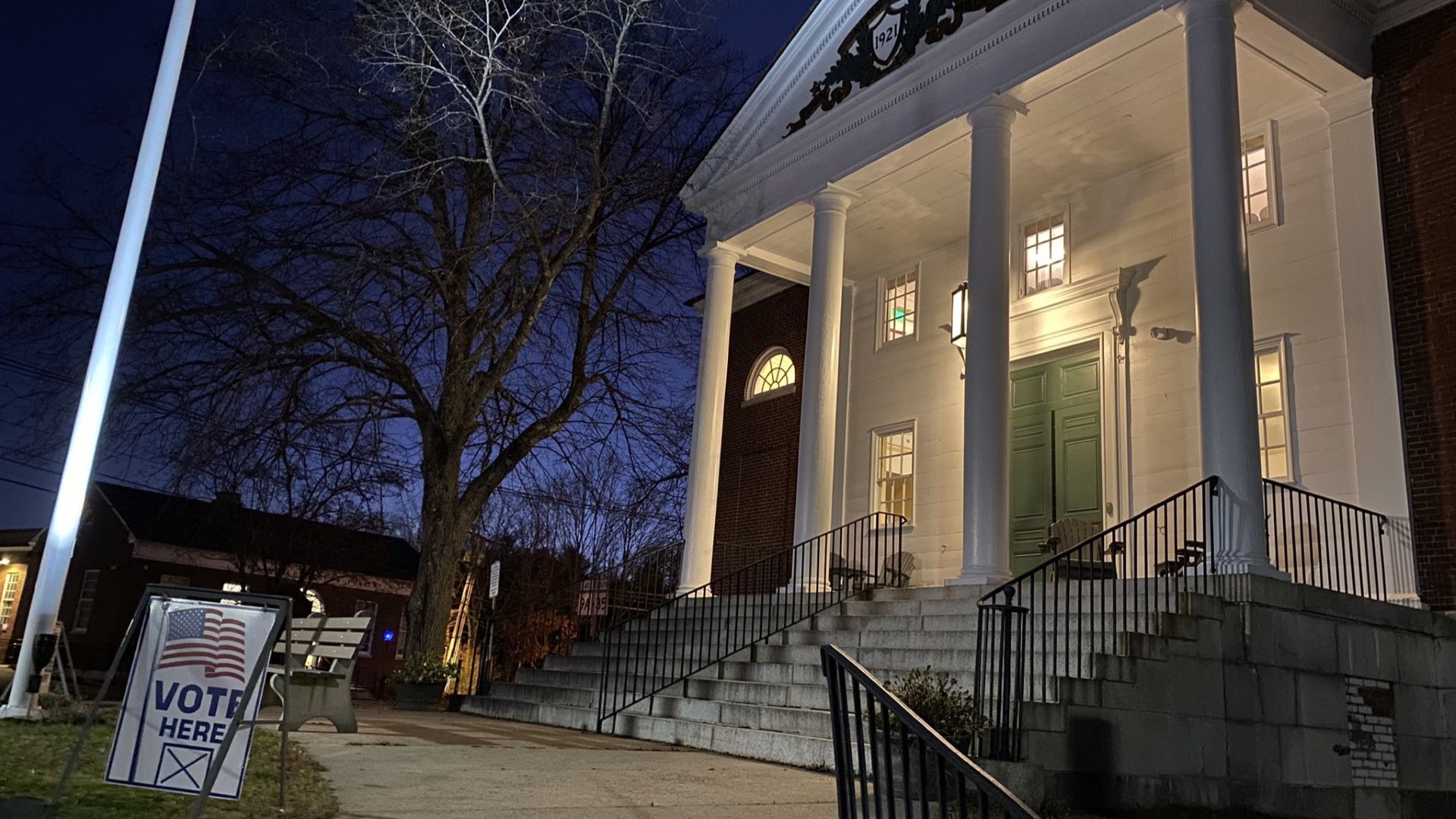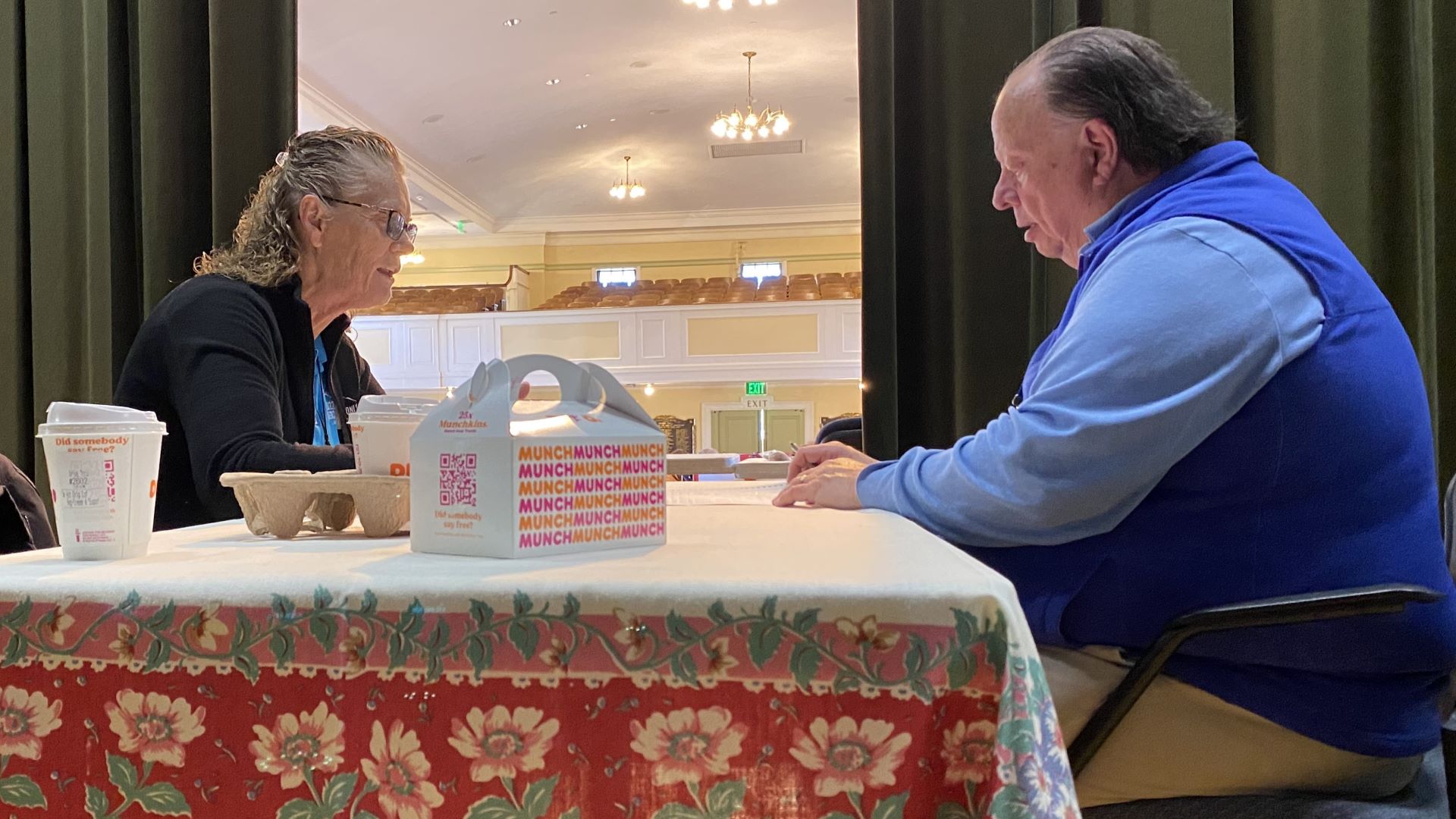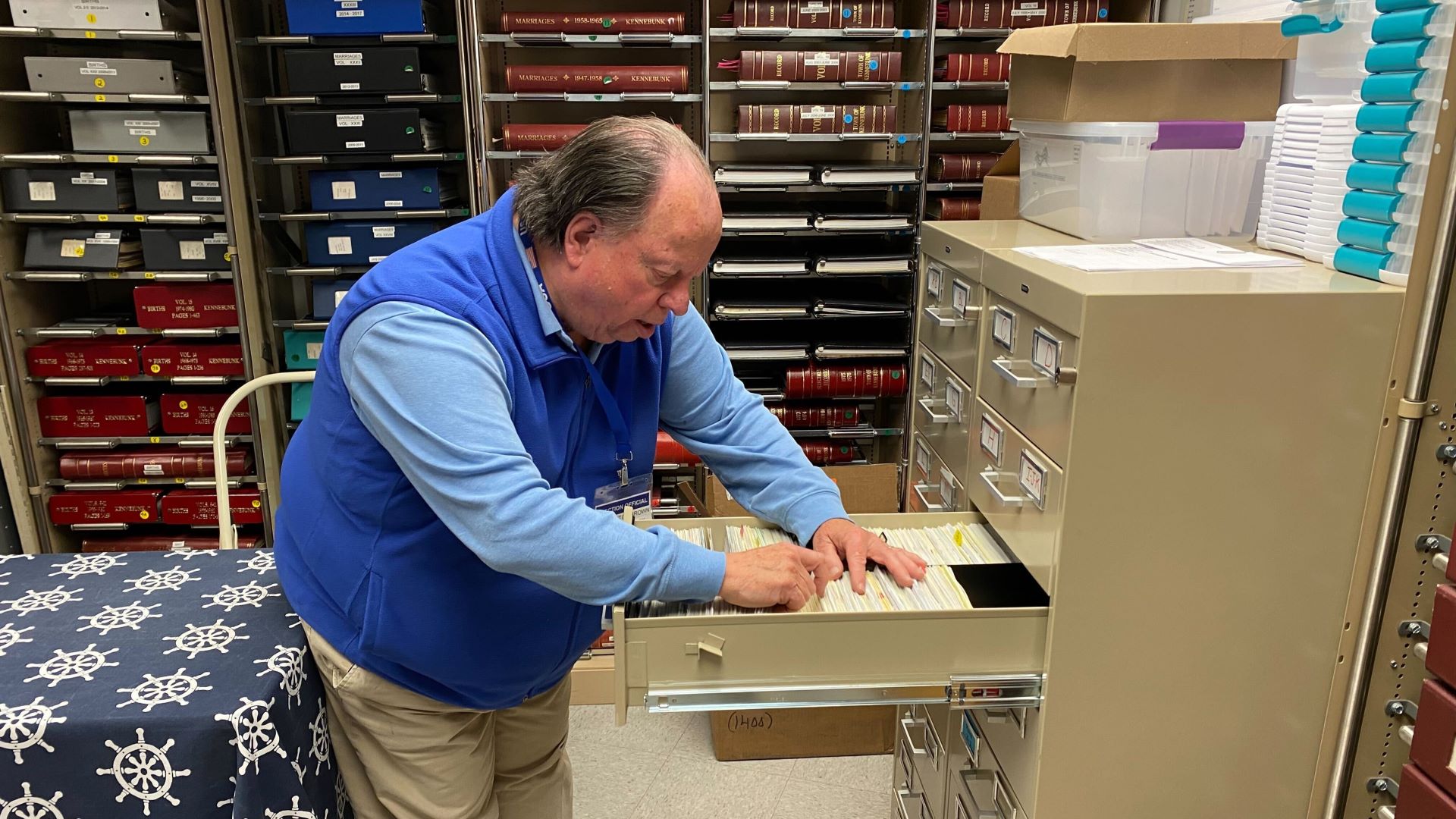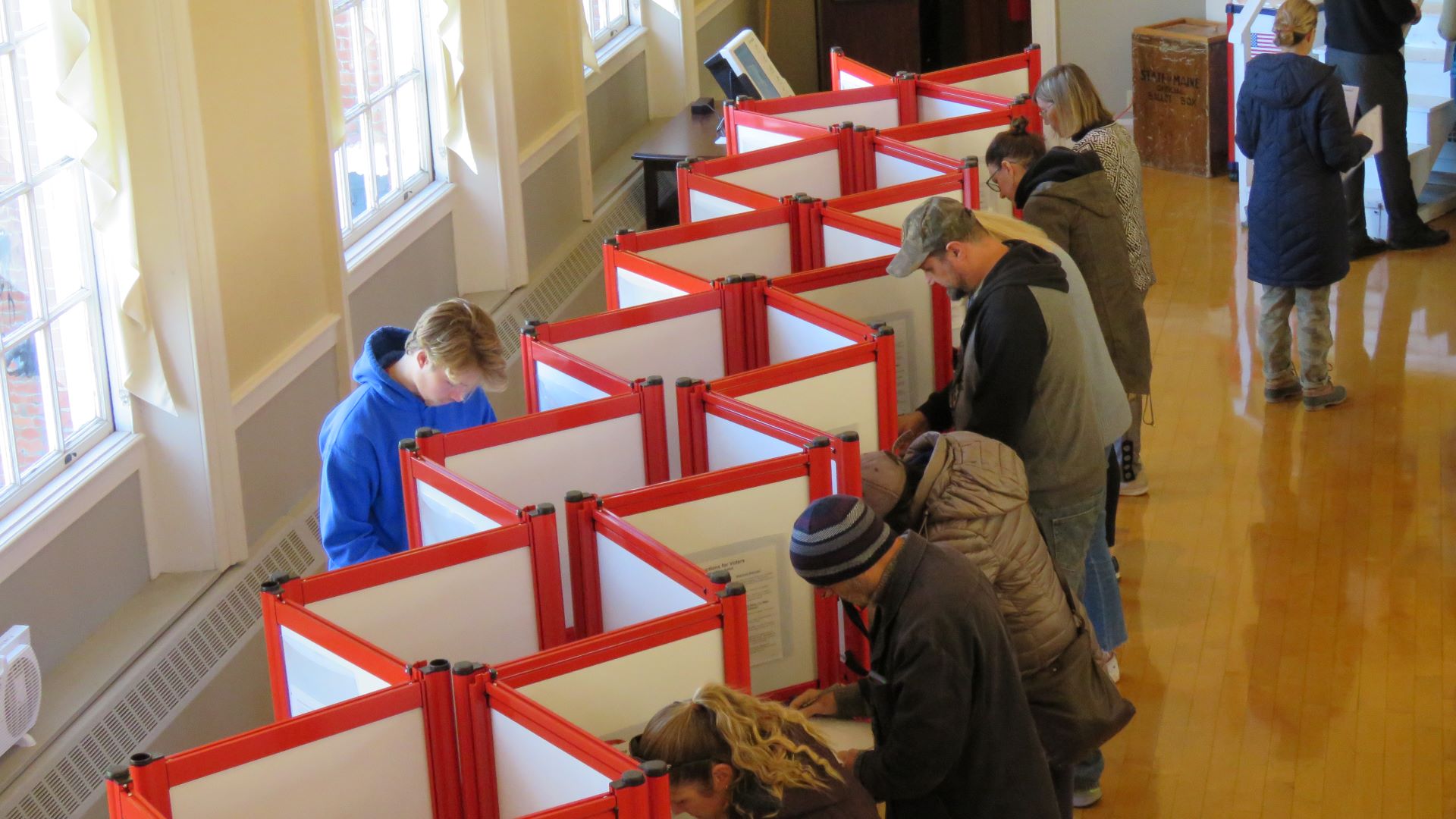By the time Kennebunk’s polling place opened at 6 a.m. for voters on Tuesday, Merton Brown had already been at work for three hours. Dressed in a blue shirt and fleece vest, he appeared undaunted as a 21-hour work day unfurled before him.
That’s the way Brown, a 48-year elections veteran, always approaches elections. Midterm elections can be especially hectic, and the rise in absentee voting pushes clerks’ organizational skills to make sure counting goes quickly and smoothly once polls close.
As the Kennebunk town clerk, Merton spent the weeks leading up to Election Day preparing and the weekend processing over three thousand absentee ballots, followed up by plenty of day-of tasks. He started Tuesday by opening the packages of ballots at the Kennebunk Town Hall auditorium, and by 6 a.m. had sworn in a town moderator. A few minutes later, he greeted Secretary of State Shenna Bellows when she made her first stop at many polling stations Tuesday. He gave her a “Kennebunk”-emblazoned thermal mug.
The sun was not even up yet but Brown was alert and chipper. He does not drink coffee — “I like to say I’m naturally caffeinated,” he said last week — but instead was powered by the zeal for being helpful that he brings to his everyday clerking duties, his coworkers said.

While this election has been marked by record amounts of spending and questions about whether Republicans will gain ground after four years of being in the minority in Augusta, the actual work of making an election run smoothly and accurately belongs to the municipal clerks of Maine. A team of volunteers tend to many details, like telling voters where to change their address or making sure each voting station is stocked with pens, but Brown himself is the conductor of the day-long orchestra.
He’s keenly aware of the importance of the job, even more so this year. Election deniers across the country are already challenging mail in ballots and poll workers are facing increasing intimidation efforts. Maine has yet to see similar incidents but officials were careful as voting day approached.
Misinformation about elections has slowed some clerks down as they have seen multiple instances of copy-cat requests for information.
“Everything we do here is by the book,” Brown said. “That’s the comfort level every clerk should have on Election Day.”
To shine some light on the work that makes Election Day run, The Maine Monitor followed Brown and his team from dawn till dusk. That meant shadowing Brown as he registered voters, processed absentee ballots and answered countless questions about the process. Those small interactions and the unique viewpoints workers have illustrated the care that goes into the voting process — and how important community trust is to that process
For the majority of voters in Kennebunk, a Democratic-leaning York County town, their questions about the process were easy: Dozens of people received absentee ballots, but wanted to vote in person. Some voted for multiple people in a race or misread the question before they submitted their ballot, leading to them needing a new ballot. The majority of people simply needed to know where to check in or where to register.
But some situations required a more delicate touch. Jeannie Cannell is currently living in a hotel after being homeless for several months with her sick husband and daughter. Her situation improved somewhat after the Portland Press Herald profiled her, but finding a stable address is still a challenge.
Maine allows transient and homeless people to vote. But Cannell was not confident in her ability to read and understand the ballot. For Brown, it was no problem at all — the two stepped behind the stage of the auditorium, and he read the ballot to her.

Cannell did not understand the first question after it was read to her, so she skipped it. But she liked a question allowing local firefighters and police officers to retire earlier and a measure allowing Kennebunk to use federal COVID-19 relief money.
After she filled out her ballot, Cannell mentioned she was not sure how she would pull a Thanksgiving dinner together in the hotel she is staying at. Brown gave her his personal cell phone — he knows someone who could make sure she has a meal, he said.
For Brown, it was a simple courtesy to make sure Cannell could vote. “I try to get a sense of what people want to do with their vote, and what issues are going to matter to them when I explain each question,” he said.
For Cannell, it was another sign of the generosity people have shown her since she sought help.
“Lots of times I never voted because I didn’t think it made a difference,” she said. “So I really appreciated that he took the time to do that.”
At other points Tuesday, Brown’s job was about observation and filling in the gaps. He directed a police officer to move a chair at one of the town’s sit-down ballot booths so that a woman who used a wheelchair would not have to move it herself before she had finished checking in. He noticed a line at the voter registration table – and Brown hates lines, because they waste voters’ time — and jumped in to help.
There were small dramas throughout the day. Workers could not match a messy signature to an absentee ballot, which could cause it to be rejected. One voter fed a state ballot into a local ballot voting machine, which created a jam. Workers were able to get it out with only minor wrinkling.
A tense situation developed after workers could not find Thomas Rouilard, who said he lived in Kennebunk all his life, in the voter rolls. Rouliard was frustrated, saying the town had mislabeled his political party in a previous election.
Brown went upstairs to the vault of registration cards, a modest filing cabinet surrounded by volumes of death certificates and marriage records. Turns out, Rouliard had registered to vote in Arundel after living there for six months in 2018, which he said he forgot about. Five minutes later, he was reregistered and in line to vote.
“I’m entirely pleased with how it turned out,” Rouliard said. “All things considered, I think it was handled as well as it could have been.”

Other storylines were more provincial. Brown asked workers to bring their own food to cut down on the hassle of ordering out. A concerned citizen caught wind of this, and put out a clarion call to make sure Kennebunk workers would not go unfed.
By Tuesday morning, people had sprung into action. First apple cider, then bags of sandwiches and Domino’s pizza began to arrive during lunch time. A local eatery donated a tray of lobster rolls. Brown thanked the volunteers for the food — but on the side, worried the food would be wasted. It was donated to local first responders.
Most down time is spent getting absentee ballots ready for counting. It is a lengthy process — Brown and his team need to match the signature to the file of requested ballots, time stamp them, and then go back through the ballots to certify they are ready to be processed. The quicker they could get through the ballots, the faster workers could go home Tuesday night.
Brown, 73, grew up in Bethel, where he first cultivated a love of local government early on. At around age 10, he stumbled into a town meeting where participants were discussing a zoning change to prohibit mobile homes from being placed on the main road. He was fascinated by the process.
His first election he helped run was during Jimmy Carter’s 1976 campaign for president. He has worked every election since.
Clerical work might not sound like fun for everyone, but Brown said his love for his job stems from getting enjoyment out of helping people through what some might see as a tedious process. His other gig for a while was managing the office of a local H&R Block.
“What people might perceive as a complicated process, I perceive as fun,” he said.
Even after his wife retired over a year ago from her job as a Wells Elementary School teacher, Brown does not see himself hanging up his lanyard anytime soon. “Why would I do that?”
Many people in town seem to know Brown, even if he does not know them. Several congratulated him for winning the Lighthouse Award, an honor given out by the Maine Town and City Clerk’s Association. One woman told him her daughter would not have voted if he had not spoken previously with her on the phone about how easy the process is.
It is praise that gives him pause.
“I have a hard time accepting the compliments sometimes,” he said. “I’m just doing my job.”

Brown instead likes to point to the dozens of volunteers and town employees who help him put the whole production together. Linda Johnson, a poll worker who has been doing this work almost since she first came to Kennebunk 45 years ago, said she has been drawn to the job because of the excitement people feel when they get to participate in the democratic process.
Working with someone as knowledgeable as Brown makes it easier, she said.
“Any time someone’s got a question about the ballot, I tell them ‘Go ask Merton,’” she said.
After polls closed at 8 p.m., the next phase of the election unfolded quickly. Brown knew he had a limited time to keep volunteers engaged before they wanted to head home — he asked anyone who was willing to stay to help remove ballots from the machines and sort them. Once that is over, he faced the meticulous work of feeding ballots into the tabulator under the watchful eye of candidates waiting to see their fate. They were likely to be at work until 11 p.m.
It is enough work to exhaust anyone. But if anyone was going to run out of steam Tuesday night, it was not going to be Brown.
“Oh God no,” he said, when asked if he was tired. “The next part is the most exciting.”
Caitlin Andrews covers state government and elections for The Maine Monitor. Reach her by email with other story ideas: gro.r1754675075otino1754675075menia1754675075meht@1754675075nilti1754675075ac1754675075.








